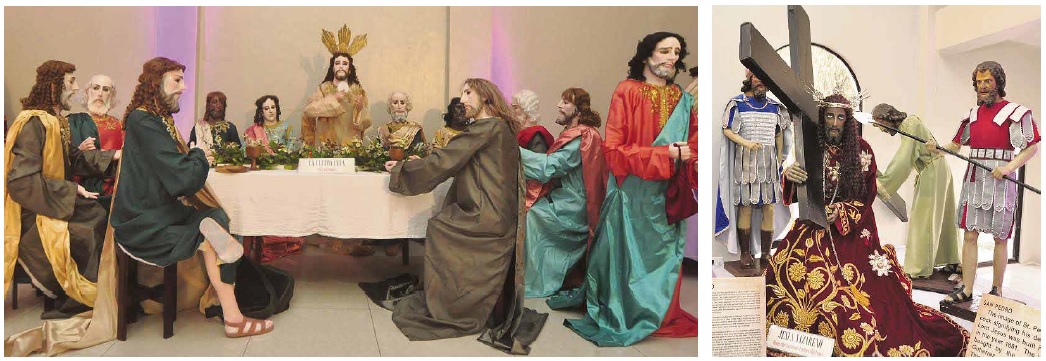Treasured religious images of Talisay clans out for Good Friday rites

A tableau of “The Last Supper” and an image of “Jesus Nazareno (Jesus the Nazarene)” are among the prized religious icons kept by generations of families in Talisay City. —PHOTOS BY ANDY ALVAREZ / CONTRIBUTOR
TALISAY CITY—Julio Diaz, the patriarch of a prominent clan in this city in Negros Occidental province, once found an image of Jesus the Nazarene in a ditch after a storm. Seeing the sad state of the life-size statue, he decided to ask the owner if he could keep it. The owner agreed.
That was in the early 1900s and the icon that portrays Christ carrying the cross (Jesus Nazareno) has been with the family for four generations.
It was one of the 17 religious icons showcased here for the monthlong exhibit at the San Nicolas Hall of the San Vicente Ferrer chapel.
The exhibit ends today to allow organizers to prepare for the annual Good Friday procession in the city, where the icon will be among the 22 religious images to be featured.
Kenneth Parran, organizer of the exhibit, said they decided to put the religious icons together so people, especially the youth, would be aware of their importance to Christianity.
Article continues after this advertisement“When the images join processions, participants only get to see them briefly, unlike in an exhibit, where visitors can take their time appreciating and learning about them,” he said.
Article continues after this advertisementSome of the images owned by Talisay families date back to more than 100 years, like the “Jesus the Nazarene” statue of the Diaz family.
According to the family tale, the statue may have fallen
from the “andas,” a platform carried by men during a procession, before Diaz found it following a storm.
Larry Lacson, Diaz’s great grandson, said he had no idea when and where the statue was found because the story passed on to them by their elders lacked details.
But he said it could have happened in the early 1900s. Since then, the family has kept the Nazarene, dressing it up in time for the Good Friday procession.
Later, the family added some characters, among them, Simon of Cyrene and two soldiers, into the “paso” (tableau).
Stories of miracles attributed to the Nazarene had been passed down through generations. When houses in Talisay were being burned by guerrillas during World War II, Diaz’s house was saved because a “mestizo in a maroon garment” was seen putting out the fire.
Devotees to the Nazareno had claimed that their prayers had been answered and sickness cured.
The preservation and upkeep of the Nazareno is now in the hands of the Lacson-Diaz clan.
Another image with an interesting story is the Jesus de la Paciencia, which was found inside a barn by the late Julio Cuenca in 1906. The image was covered with rice straws and lime powder.
When Cuenca asked the farm caretaker why it was dumped there, the caretaker said he was told by his late master to throw away the image because he had renounced his Catholic faith.
But the caretaker was afraid to get rid of the statue, so he hid the image in the barn.
Mystery also surrounds the statue of Santa Maria de Betania found in the home of the late Don Esteban de la Rama in Bago City while it was being demolished.
Among the larger exhibits is “The Last Supper,” also known as the “La Ultima Cena,” owned by Suzette Lacson. It is composed of 13 images carved by Roger Gaylan of Barangay Bata in Bacolod City.